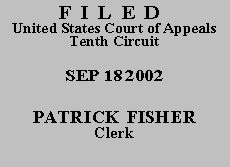

| UNITED STATES OF AMERICA,
Plaintiff - Appellee, v. ROBERT LEE BRYANT, Defendant - Appellant. |
|
Mr. Bryant acknowledges that this court has no jurisdiction to review a district court's discretionary ruling on a motion for downward departure. See United States v. Castillo, 140 F.3d 874, 887 (10th Cir. 1998). His argument is that we should exercise jurisdiction to review a district court's erroneous interpretation of the guidelines in reaching its discretionary decisiona situation he claims exists here because the district court erred in concluding that his particular set of circumstances did not remove his case from the heartland of typical cases.
We have jurisdiction to review a sentencing court's refusal to depart from the sentencing guidelines [only] in the very rare circumstance that the district court states that it does not have any authority to depart from the sentencing guideline range for the entire class of circumstances proffered by the defendant. In other words, we possess no jurisdiction when a sentencing court concludes under the defendant's particular circumstances that it does not have the authority to depart.
United States v. Mendez-Zamora, 296 F.3d 1013, 1018-19 (10th Cir. 2002) (quotations and citations omitted). After reviewing the sentencing transcript, it is clear that the district court understood it had authority to depart downward, but it concluded that because the circumstances of the case were within the heartland of typical cases, departure was not warranted. Further, this court has held that we have no jurisdiction to do what Mr. Bryant urgesexamine the district court's decision on whether this case fell outside the heartland of typical cases so as to warrant departure. See Castillo, 140 F.3d at 887 (stating that reviewing "the merits of whether the defendant's proffered circumstances are appropriate grounds for departure" is not prerequisite to decision that court of appeals lacks jurisdiction and, in fact, is not authorized).
We have no jurisdiction to review the district court's denial of the departure motion. Consequently, we DISMISS the appeal.
Entered for the Court
Circuit Judge
*. This order and judgment is not binding precedent, except under the doctrines of law of the case, res judicata, and collateral estoppel. The court generally disfavors the citation of orders and judgments; nevertheless, an order and judgment may be cited under the terms and conditions of 10th Cir. R. 36.3.
1. After examining the briefs and appellate record, this panel has determined unanimously to grant the parties' request for a decision on the briefs without oral argument. See Fed. R. App. P. 34(f); 10th Cir. R. 34.1(G). The case is therefore ordered submitted without oral argument.